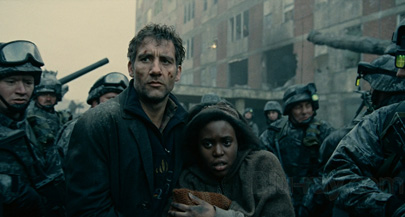|
|
10-Year Retrospective: Children of MenBy Ben GruchowDecember 20, 2016
This same tone, above all else, is what animates and singles out Alfonso Cuaron's 2006 dystopian film Children of Men among even its (otherwise) equals. The actual events of the film (which I'll get to in just a moment) are less significant for what they are than for how they are - thoroughly disruptive passages of physical and emotional upheaval. This temperature forms the subject of this year's retrospective: a seminal, game-changing instance of narrative cinema's power in its rawest and undiluted form. That's a lot of hyperbole to issue all at once; no film since has earned it more. The movie takes place in Britain, in the year 2027. For reasons unknown to us, no child has been born in 18 years. For obvious reasons, this spells doom for the human race; other nations around the world have fallen to chaos and riots in the face of an extinction arriving sooner than anyone thought possible. Only the United Kingdom has survived, seemingly by succumbing to its darkest, most isolationist and nativist elements and transforming itself into a police state. Population is tightly controlled, and would-be immigrants are turned away (that we never see the effects of this scenario on another country, and have only the grey reality of London to refer to as the apparent pinnacle of civilized life, is one of this movie's more invisible insinuations). Refugees found within Britain (dubbed “fugees” in the vernacular of the film) are rounded up by police and placed into deportation camps, generally referred to by the names of the cities they used to be. We are introduced to Theo Faron (Clive Owen) in a cafe, surrounded by people watching TV, as a newscaster remarks on the death of “baby Diego” - so nicknamed because, at 18 years, he was the youngest person on the planet. How did Diego die? Stabbed by refusal to give an autograph. Theo walks out of the cafe, unmoved. Then a bomb goes off inside the café, blowing glass and shrapnel and dust out onto the street. This is our introduction to the London of this world. Later, Theo receives a message from Julian (Julianne Moore), leader of a notorious rebel group calling itself the Fishes. The Fishes are endeavoring to transport a young black refugee named Kee (Clare-Hope Ashitey) away from London before she can be captured and deported, and they need Theo's help to secure the proper papers. It does absolutely no good to proceed without revealing the central hook of the movie's storyline (the trailers in 2006 spoiled the hell out of it anyway, so it's not like it was much of a closely-guarded secret), which is that Kee is very pregnant, and the goal of the Fishes is to get her to a secret organization called The Human Project. The Project stands to allow Kee to give birth and raise her child in peace, without becoming a science experiment or prisoner of the state.
|

|
|
|

|
Friday, November 1, 2024
© 2024 Box Office Prophets, a division of One Of Us, Inc.


